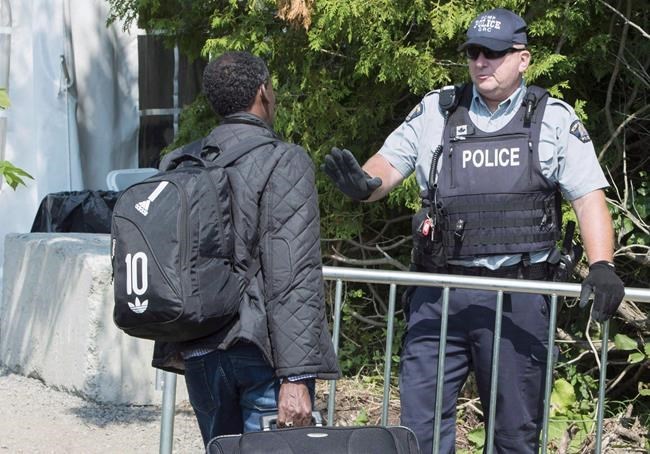
An asylum seeker is questioned by an RCMP officer as he crosses the border into Canada from the United States Monday, August 21, 2017 near Champlain, N.Y. THE CANADIAN PRESS/Paul Chiasson
Republished September 15, 2021 - 2:18 PM
Original Publication Date September 15, 2021 - 12:26 PM
OTTAWA - Refugee claimants and their advocates are asking the Supreme Court of Canada to review a decision that affirmed the constitutionality of a key pact between Ottawa and Washington on asylum seekers.
In a submission to the high court, they say the case raises "foundational questions of constitutional law" concerning access to remedies for violations of the Charter of Rights and Freedoms.
Under the Safe Third Country Agreement, which took effect in 2004, Canada and the United States recognize each other as safe places to seek protection.
It means Canada can turn back potential refugees who arrive at land ports of entry along the Canada-U.S. border on the basis they must pursue their claims in the U.S., the country where they first arrived.
Canadian refugee advocates have vigorously fought the asylum agreement, arguing the U.S. is not always a safe country for people fleeing persecution.
Several refugee claimants took the case to court along with the Canadian Council for Refugees, the Canadian Council of Churches and Amnesty International, who participated in the proceedings as public interest parties.
In each case, the applicants, who are citizens of El Salvador, Ethiopia and Syria, arrived at a Canadian land entry port from the U.S. and sought refugee protection.
They argued in court that by returning ineligible refugee claimants to the U.S., Canada exposes them to risks in the form of detention and other rights violations.
In her decision last year, Federal Court Justice Ann Marie McDonald concluded the Safe Third Country Agreement results in ineligible claimants being imprisoned by U.S. authorities.
Detention and the consequences flowing from it are "inconsistent with the spirit and objective" of the refugee agreement and amount to a violation of the rights guaranteed by Section 7 of the charter, she wrote.
"The evidence clearly demonstrates that those returned to the U.S. by Canadian officials are detained as a penalty."
However, the Federal Court of Appeal overturned the decision earlier this year.
"The alleged constitutional defect in this case stems from how administrators and officials are operating the legislative scheme, not the legislative scheme itself," the appeal court said.
"But because the claimants chose not to attack any administrative conduct, we have neither the ability nor the evidence before us to assess it."
The appeal court also found the legislative regime consistent with the charter unless the treatment experienced by those sent back to the U.S. could be shown to “shock the conscience."
In their application to the Supreme Court, the claimants and their advocates say the effect of the decision is to insulate the Safe Third Country regime from constitutional review "and to erect major obstacles to constitutional scrutiny of federal legislation generally."
Federal lawyers have yet to respond to the application for a Supreme Court hearing. The high court is expected to decide in coming weeks whether to hear the case.
This report by The Canadian Press was first published Sept. 15, 2021.
News from © The Canadian Press, 2021